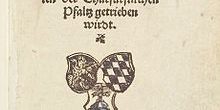
450 Years of the Heidelberg Catechism
By Matthew Barrett–
This past Saturday marked the 450 anniversary of the Heidelberg Catechism. While there is much we could say about this Reformed catechism (and much we will say in 2013…stay tuned), I cannot think of a better place to start than Lord’s Day 5 “Of Man’s Redemption,” which begins to articulate the gospel and our great need for a Savior in Christ Jesus.
Question 12.Since, then, by the righteous judgment of God we deserve temporal and eternal punishment, how may we escape this punishment and be again received into favor?
Answer: God wills that His justice be satisfied (Ex. 20:5; Ex. 23:7); therefore, we must make full satisfaction to that justice, either by ourselves or by another (Rom. 8:3-4).
Question 13. Can we ourselves then make this satisfaction?
Answer: Certainly not; on the contrary, we daily increase our guilt (Job 9:2-3; Job 15:15-16; Matt. 6:12).
Question 14. Can any mere creature make satisfaction for us?
Answer:None; for first, God will not punish any other creature for the sin which man committed (Heb. 2:14-18); and further, no mere creature can sustain the burden of God’s eternal wrath against sin (Ps. 130:3) and redeem others from it.
Question 15. What kind of mediator and redeemer, then, must we seek for?
Answer: One who is a true (1 Cor. 15:21-22, 25-26) and righteous man (Jer. 33:16; Isa. 53:11; 2 Cor 5:21; Heb. 7:15-16), and yet more powerful than all creatures, that is, one who is also true God (Isa. 7:14; Heb. 7:26).
The catechism goes on to explain that Jesus Christ is the God-man who is our mediator and redeemer. And it is because of what he has done–satisfying the eternal wrath of God against our sin–that we have such a great comfort and confidence in this life. The catechism famously begins with these words which underline where the Christian’s assurance lies:
Question 1. What is your only comfort in life and in death?
Answer: That I, with body and soul, both in life and in death (Rom. 14:7-8), am not my own (1 Cor. 6:19), but belong to my faithful Savior Jesus Christ (1 Cor. 3:23), who with His precious blood (1 Peter 1:18-19) has fully satisfied for all my sins (1 John 1:7; 1 John 2:2), and redeemed me from all the power of the devil (1 John 3:8); and so preserves me (John 6:39) that without the will of my Father in heaven not a hair can fall from my head (Matt. 10:29-30; Luke 21:18); indeed, that all things must work together for my salvation (Rom. 8:28). Wherefore, by His Holy Spirit, He also assures me of eternal life (2 Cor. 1:21-22; Eph. 1:13-14; Rom. 8:16), and makes me heartily willing and ready from now on to live unto Him (Rom. 8:1).
Please join us in the future here at Credo Magazine for further reflections on the history and theology of the Heidelberg Catechism.
Matthew Barrett (Ph.D., The Southern Baptist Theological Seminary) is Assistant Professor of Christian Studies at California Baptist University (OPS). He is also the founder and executive editor of Credo Magazine. Barrett has contributed book reviews and articles to various academic journals, and he is the editor of Whomever He Wills: A Surprising Display of Sovereign Mercy, as well as the author of several other forthcoming books.

